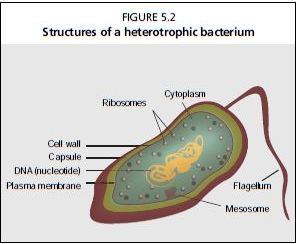5.2 HETEROTROPHIC BACTERIA AND MINERALIZATION
There is another important bacteria group, as well as other micro-organisms, involved in aquaponics. This bacteria group is generally called the heterotrophic group. These bacteria utilize organic carbon as its food source, and are mainly involved in the decomposition of solid fish and plant waste. Most fish only retain 30-40 percent of the food they eat, meaning that 60-70 percent of what they eat is released as waste. Of this waste, 50-70 percent is dissolved waste released as ammonia.
However, the remaining waste is an organic mix containing proteins, carbohydrates, fats, vitamins and minerals. The heterotrophic bacteria metabolize these solid wastes in a process called mineralization, which makes essential micronutrients available for plants in aquaponics (Figure 5.2).
These heterotrophic bacteria, as well as some naturally occurring fungi, help decompose the solid portion of the fish waste. In doing so, they release the nutrients locked in the solid waste into the water. This mineralization process is essential because plants cannot take up nutrients in solid form. The wastes must be broken into simple molecules in order to be absorbed by plants' roots. Heterotrophic bacteria feed on any form of organic material, such as solid fish waste, uneaten fish food, dying plants, dying plant leaves and even dead bacteria. There are many sources of food available for these bacteria in aquaponic units.

FIGURE 5.2 Structures of a heterotrophic bacterium
Heterotrophic bacteria require similar growing conditions to the nitrifying bacteria especially in high levels of DO. The heterotrophic bacteria colonize all components of the unit, but are especially concentrated where the solid waste accumulates. Heterotrophic bacteria grow much faster than the nitrifying bacteria, reproducing in hours rather than days. In media beds, the wastes collect on the bottom, permanently wet zone and many heterotrophic bacteria are found here. In other systems, the main colonies are Plasma membrane found on the filters and separators, and in the canals. Mineralization is important in aquaponics because it releases several micronutrients that
Cell wall Capsule DNA (nucleotide)
are necessary to plant growth. Without mineralization, some plants may experience nutrient deficiencies and would need supplemental fertilizer.
Heterotrophic bacteria are aided in the decomposition of solid waste by a community of other organisms. Often, earthworms, isopods, amphipods, larvae and other small animals can be found in aquaponic systems, especially within media beds. These organisms work together with the bacteria to decompose the solid waste, and having this community can prevent accumulation of solids.